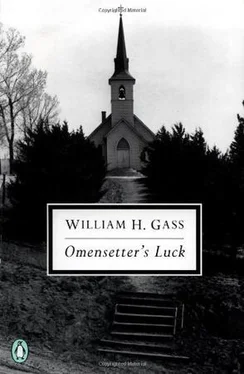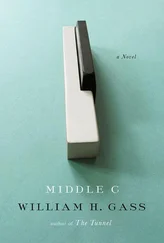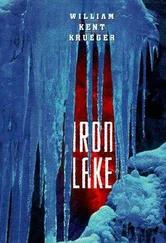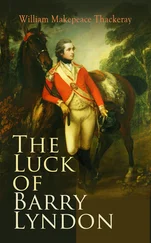He said: the fire needs wood; we must keep the room warm.
Why was it sorrowful, The Great Alternative? No hell afterward, but blessedness. What could be more blessed than to rest in a coil of silence — not to be? He'd meant to preach to that. His whole life, he'd Meant to preach, to preach… Where was his preaching and his preachment now? Would Henry's body, hanging in its tree, be dreaming? Would it be canting in itself another kind of shadow, a goblin shadow, to be feared?
But no dream could wound as cleverly as the painful edges of perception.
… while B persisted like a monstrous suspicion. Yes and No. A and …
Did they think he was praying, his head so holy, his hands so discreet in the folds of his priestly clothing? Perhaps his lips were moving. The fire sank under the added log. If there were only something in the room beside it, anything — speech — but not this ache of silence.
You can smooth the bruises from our bodies; You can sweep off the sickness that's infected them. Breathe gently on this infant, that he may one day carry in his lungs the fragrance of Your heart.
Crap.
A and… It could very well be. What kind of shadow would strangulation cast? How fares the spirit of the throttled man? The soul was once believed to exit from the mouth and nose and return on the insucked air, but just suppose, the breath cut off, belt grimly crimping in the pipe, that while the soul struggled to escape, the bungling body died? Imagine, then, this messy bit of business quickly buried with the soul still stuck like an animal inside. What sounds would funeral speeches make in a dead ear; what meaning would they carry for a skull? The body swells down there, takes water on, then pops — the spirit's out. But what, by this time, is it? What's the shadow in a swelling corpse? a chorus of shouts? Shut in the earth, it dies each minute, each minute is replaced by the reflection of a new arrangement. So it is with us. So it is with me. So. So. It is so like. Buried in this air, I rot. Moment by moment, I am not the same. And all I desire is to escape — get out. Then notice — look carefully on it — what happens when the body splits. The snow-white wormlings of the flies seethe out. The soul, the immortal principle of life, in its last condition, has come to this — this transmigration.
They are rescuing something then: Henry Pimber somewhat rearranged — who knows for worse or better? Get him down and smartly under. Play it safe. You never can tell.
Up and down, yes and no, A and B. She rocked. Suddenly it struck him — added up. It was as though he had been jumped at from the dark. Chilled. The rocker creaked. Its legs rubbed in their sockets. All this time a sound — each time the same — had issued from its motion. Yet he'd never heard it. Where was it when he'd watched the shadow pulsing, her head to the leaves and the finial to the rose, the knurl at its blotting? Now the squeal tore at his nerves. It became difficult to see.
For the boy — shall we pray? How?
He got up slowly, sweat gathering coldly on his chest and under his arms, and began to pace. Soon he would prickle. She was only an ear, not half alive, reduced to one expectation. How alive was he — the great square O? Furber risked his name, sailed it across the current of the squeak. O-men-set-ter. Now his name has entered his ear. In whose porches I poured the poison. It has penetrated to his brain. But? Nothing. Blank. Dead then, to that. Dead by so much. Nevertheless alive in some ways — movable. In stumbling shamble. Rocky-walky. Bear shuff. And in the woods the breath of the men as they climb the trees will be floating from their noses just as always. Unperceived. The spirit. The Holy Spirit.
Is it two falls out of three? God wins the first but the Devil takes the next one. There has not yet been a third to anybody's knowledge.
He had a desire to dance, to whirl while kicking his leg in the air, crying kangaroo. He would whirl and whirl and slowly mount toward the ceiling — whirling. Too bad he'd never made a study of ballet.
He was moving — stately — like a sailing ship. He saw the woodwork and the paper sliding. Then spots by. Another instance of it. So life and death were ranges of degree and no more opposite than snow and sleet or pie and pain. Note that. Four and twenty black Flacks. Everything alive. Who was the fellow who first said it? It was a matter, merely, of awake. Awake. Ho! the guard! Ho! the keep! So surely the house, and this, the stomach of the house, and these, the flickers of its feelings. Alarm within. Turn out the watch. So surely these are shadows cast inside. By. Then the bitter rocker. Bitterly alive to scrape sensations through its feet and speak. Arouse within! The treasure of the temple's stolen. So then dead — and then alive. Tick-teek. Tick-teeek. Tickteeeek. Tick-teeeeek. Everywhere upon him. Soles of his feet, behind the lids of his eyes, beneath the roots of his teeth. Furber sank into the hallway, itching intolerably, and like a hairy spider, every twitch meant victim.
Matthew, I lied. Am I not believed as one who strives to tell the truth in everything? He did not say: I am of the dark ways, preacher. He did not use those foolish words. He was merely stricken by my turns of speech and by my mad religious ways. Oh what a meager adversary after all! I could have preached in Cleveland, Matthew — in Cleveland in great cathedrals, in robes so heavy they would weary my arms. But I was fearful and vain of my righteousness, Matthew, fearful for my soul, and I came to Gilean to flee temptation, to put Satan behind me, as they say on Sunday. More terrible theology. Like Henry's in that. With my adversary, the Red Chief, all the time inside me, perched on my liver, feet crossed, meeting with the rest, making his spiel. What sayeth the psalmist? "He sitteth in ambush with the rich in secret to murder the innocent, his eyes are privily set against the poor. He lieth in wait secretly as a lion in his den; he lieth in wait to catch the poor." Poor Henry. Poor Matthew. Poor Janet. So our worthy Jerome also warns us, whose belly wants to be god in Christ's place. As I recall, it was the crotch in auntie's case. If only he could be like Splendid Turner, he thought, who had a soul like a sponge soaked in greed and fornication which Splendid simply squeezed out when he got contrite. In seminary they used to say that Jesus had an upright Peter, but I always said that swearing by that soft apostle made a limp appeal. Whoo-oo-ee. Purple thistles in dizzy rows. He laid his head against the wall, the paper wall, and shut his eyes. Dead to the thistles, the darkness, the golden wood. Musty, cool — the paper wall. If he had an eye at the end of a line and payed it to the bottom of the river, while he stared with his own pair at the sky, what sort of world would his three eyes put together? My eyes comprise… Little pimples of plaster, the weight of his body in his soles, old paper, damp paper, cold tips of finger, cloth cooling at the corners of his shoulders and elbows, vague pale rings against his closed lids…Or an eye like an aggie — rolling to the corner. To spin into illness. No, the soul a balloon. It was how much air you got. A French invention. Montpellier was it? Like the town. And then stirring behind him. And voices. He swung around. Heat rises. The soul swells and sails to heaven. Bye baby bunting. No. It is the corpse which obliges. Firm flesh refines itself to fearful fumes by water. Who was the fellow? Goes off like a cannon. The capture of Paris. A French invention. He was alive to the firelight, to the moving rows of thistles. If I kick my feet and whirl, I shall rise to the ceiling. I should have studied dancing, I move so gracefully sometimes. You're quite a sport, Furls; you can play the picnic on our banjo.
Great and mighty God, who has brought us down to the grave as careless children to the sea, bring us back from there, for now we are afraid, for we have seen our own death in the heavy water, in the sand our toes have squeezed the print of our own end…
Читать дальше












![William Frith - John Leech, His Life and Work, Vol. 2 [of 2]](/books/748201/william-frith-john-leech-his-life-and-work-vol-thumb.webp)